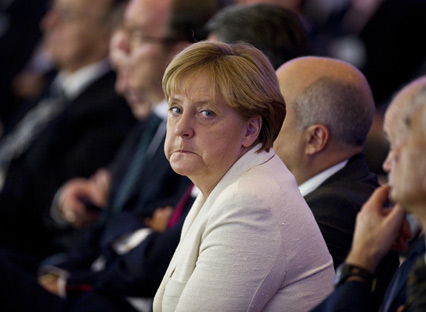Angela Merkel's burka ban met with overwhelming support
Full-face veils are 'not acceptable' in German society, Chancellor tells party conference

A free daily email with the biggest news stories of the day – and the best features from TheWeek.com
You are now subscribed
Your newsletter sign-up was successful
Angela Merkel's proposal for a partial ban on full-face veils in Germany has been met with overwhelming public support.
Speaking at the Christian-Democratic Union (CDU) party conference in Essen this week, the German Chancellor told delegates "the full-face veil is not acceptable in our country" and she would support a ban "wherever legally possible".
The proposals, first outlined by interior minister Thomas de Maiziere in August, would ban niqabs and burkas in places deemed "necessary for our society's coexistence", such as in government offices, schools, universities and courtrooms.
The Week
Escape your echo chamber. Get the facts behind the news, plus analysis from multiple perspectives.

Sign up for The Week's Free Newsletters
From our morning news briefing to a weekly Good News Newsletter, get the best of The Week delivered directly to your inbox.
From our morning news briefing to a weekly Good News Newsletter, get the best of The Week delivered directly to your inbox.
Merkel's comments were met with applause and cheering from delegates and appear to have public approval as well.
A recent survey found 81 per cent of Germans believe burkas and niqabs should not be worn in some public places, while 51 per cent want a total ban on religious face coverings, Deutsche Welle reports.
"Support for bans on full-face veils has been growing across Europe since France became the first country to implement such a law in 2011," The Independent says. Dutch MPs approved a similar measure last month.
However, several commentators have questioned the need for a ban in Germany as only a small fraction of women wear the full-face veil.
A free daily email with the biggest news stories of the day – and the best features from TheWeek.com
Gabriele Boos-Niazy, the chairwoman of the German Alliance of Muslim Women, says she believes the number to be fewer than 100 and that many of those tourists.
The alliance previously referred to nursery nurses not being allowed to wear headscarves at work as "a disproportionate interference with the freedom of religion".
The proposed burka ban is part of a CDU platform promising a harder line on integration and a tougher policy on asylum seekers, including stepping up deportations of applicants who do not meet the criteria.
However, general secretary Peter Tauber insisted the CDU was pursuing a "policy of the outstretched hand, not a fist", Der Spiegel reports.
The Chancellor also said last year's scenes of hundreds of thousands of migrants pouring into Germany "would not happen again".
The CDU will be hoping her tough talk can boost her approval ratings before next year's general election. A fourth term would put Merkel in line to equal the record-breaking tenure of Germany's longest-serving Chancellor Helmut Kohl, who held onto the office from 1982 to 1998.
-
 The problem with diagnosing profound autism
The problem with diagnosing profound autismThe Explainer Experts are reconsidering the idea of autism as a spectrum, which could impact diagnoses and policy making for the condition
-
 What to know before filing your own taxes for the first time
What to know before filing your own taxes for the first timethe explainer Tackle this financial milestone with confidence
-
 The biggest box office flops of the 21st century
The biggest box office flops of the 21st centuryin depth Unnecessary remakes and turgid, expensive CGI-fests highlight this list of these most notorious box-office losers
-
 Epstein files topple law CEO, roil UK government
Epstein files topple law CEO, roil UK governmentSpeed Read Peter Mandelson, Britain’s former ambassador to the US, is caught up in the scandal
-
 Iran and US prepare to meet after skirmishes
Iran and US prepare to meet after skirmishesSpeed Read The incident comes amid heightened tensions in the Middle East
-
 Israel retrieves final hostage’s body from Gaza
Israel retrieves final hostage’s body from GazaSpeed Read The 24-year-old police officer was killed during the initial Hamas attack
-
 China’s Xi targets top general in growing purge
China’s Xi targets top general in growing purgeSpeed Read Zhang Youxia is being investigated over ‘grave violations’ of the law
-
 Panama and Canada are negotiating over a crucial copper mine
Panama and Canada are negotiating over a crucial copper mineIn the Spotlight Panama is set to make a final decision on the mine this summer
-
 Why Greenland’s natural resources are nearly impossible to mine
Why Greenland’s natural resources are nearly impossible to mineThe Explainer The country’s natural landscape makes the task extremely difficult
-
 Iran cuts internet as protests escalate
Iran cuts internet as protests escalateSpeed Reada Government buildings across the country have been set on fire
-
 US nabs ‘shadow’ tanker claimed by Russia
US nabs ‘shadow’ tanker claimed by RussiaSpeed Read The ship was one of two vessels seized by the US military